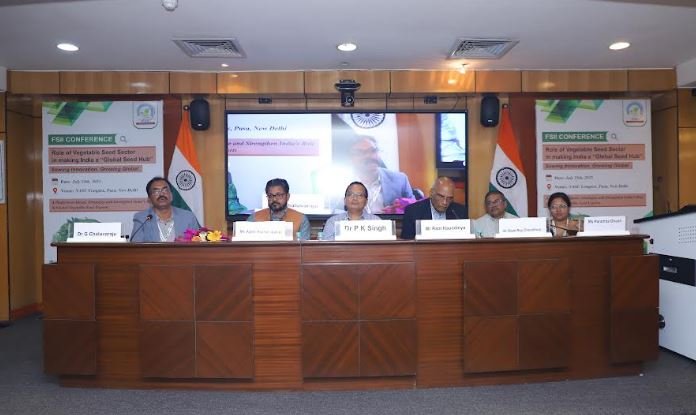New Delhi, Delhi, India | 31st July 2025: The global vegetable seed market, valued at $8.45 billion in 2024, is witnessing robust growth — and experts believe India is on track to become a global seed hub, provided strategic policy reforms are enacted and enforced effectively.
At the national conference on “Role of Vegetable Seed Sector in Making India a Global Seed Hub”, organized by the Federation of Seed Industry of India (FSII) in New Delhi, top policymakers, agricultural scientists, and industry leaders outlined India’s massive potential to emerge as a powerhouse in vegetable seed exports and innovation.
India’s Vegetable Seed Market Set to Reach $970 Million by 2030
India’s domestic vegetable seed market, currently worth $740 million (2023–24), is projected to grow at a CAGR of 4.6%, reaching $970 million by 2030, thanks to government initiatives and private sector innovation.
“India’s rise in horticulture, especially vegetable production, is driven by rich germplasm, varied agro-climatic zones, and significant R&D investments,” said Dr. P. K. Singh, Agriculture Commissioner, Ministry of Agriculture & Farmers Welfare. “Seed sector R&D, hybrid seed adoption, and a science-driven ecosystem have brought horticulture to the forefront.”
Government Push for Science-Led, Digitally Enabled Seed Industry
Mr. Ajeet Kumar Sahu, IAS, Joint Secretary (Seeds), emphasized the Ministry’s efforts to build a globally competitive seed sector. Key initiatives include:
- Science-based regulatory reforms
- QR code-based digital seed traceability through the SATHI platform
- Investments in seed infrastructure (processing units, testing labs, and cold storage)
- Streamlined licensing systems
“These steps aim to provide farmers with timely access to certified, high-quality seeds while reducing crop losses and improving productivity,” Sahu added.
Unlocking India’s Seed Export Potential
India currently exports $120 million worth of vegetable seeds annually, primarily to Southeast Asia and the Middle East. Experts estimate this could double or even triple if policy bottlenecks are cleared — notably the 100+ pending Pest Risk Analyses (PRAs) that have held back trade worth $55 million since 2016.
Mr. Rajvir Rathi, Vice Chairman of FSII and Director at Bayer CropScience Ltd., urged the government to adopt a unified regulatory approach with reforms such as:
- One Nation, One Licence for domestic seed registration
- Single-window export clearance
- Digitized, fast-tracked approvals
- Longer-duration licenses
“These are critical for improving the ease of doing business in India’s seed sector,” he said.
India’s Competitive Advantages in Global Seed Trade
India holds several strategic advantages:
- Diverse agro-climatic zones for year-round seed production
- Low production costs and a skilled workforce
- Over 300 formal seed companies, contributing 80–85% of market value
- More than $200 million invested annually in seed R&D
These factors collectively position India as a strong contender in the global vegetable seed export market.
Socio-Economic and Nutritional Impact of the Vegetable Seed Industry
Beyond economic gains, the vegetable seed industry:
- Supports over 100,000 direct jobs
- Empowers women farmers and smallholders
- Provides year-round rural income
- Improves nutrition through biofortified vegetables that combat micronutrient deficiencies
A Call to Reform, Innovate, and Lead
As the world grapples with climate change, food security, and population growth, stakeholders at the conference emphasized the urgent need for regulatory reforms, continuous innovation, and public-private collaboration.
“The seeds of global leadership have already been sown,” concluded the conference, echoing a shared vision: India must move quickly to become the world’s most reliable and responsible supplier of high-quality vegetable seeds.







